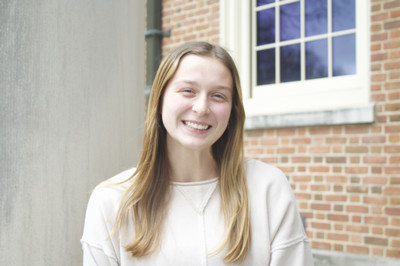
At the heart of Samford University’s growing mental health advocacy movement is McKinnley Meyer, a junior psychology major from Navarre, Florida. With a passion for sports and well-being, Meyer is working to promote suicide prevention, a mission shaped by losing a mentor in high school.
“I didn’t get the help I needed, and I didn’t even know it was an option at the time,” Meyer said. “I want to be a person that athletes can turn to.”
Meyer’s advocacy began with an internship researching chronic traumatic encephalopathy (CTE) under Darin White, professor of marketing in Brock School of Business and executive director of Samford’s Center for Sports Analytics. While the work was insightful, she realized her true passion lay in addressing the mental health struggles of athletes. Seeking an opportunity aligned with that focus, she connected with Robert Elsner, psychology department professor and chair, as well as the chair of research for Athletes for Hope, a national nonprofit.
“We are conditioned to not talk about the saddest and worst things, for fear of making them come true,” Elsner said. “This is exactly backwards. We must speak about things like suicide to prevent them from becoming reality. McKinnley’s work with Athletes for Hope is a bold step forward for Samford.”
An organization with ties to professional athletes including Steph Curry, Athletes for Hope promotes philanthropy and advocacy. Through this partnership, Meyer has developed a suicide prevention campaign specifically for student-athletes.
While researching, she found little information tailored to athletes but came across an article about a student who created a sticker reading, “Thinking of suicide? You can talk to me.” Inspired, Meyer designed a similar sticker for Samford’s campus.
“I thought that was a really cool concept and a super easy way to bring awareness,” she said.
Beyond the sticker, Meyer created a five-step action plan to help students recognize and respond to peers in crisis. She and her team plan to distribute the stickers and cards at athletic events and across campus. She also envisions a pledge campaign encouraging students to take an active role in mental health awareness.
Meyer’s personal journey fuels her advocacy. In high school, she lost a beloved basketball coach to a car accident and later faced difficulties with a coach who undermined her confidence. “I went from having an incredible mentor to feeling completely alone,” she said. “That’s when I realized how important mental health support is for athletes.”
Meyer’s aspirations extend beyond Samford’s campus, as she plans to pursue a graduate degree in sports psychology and hopes to start by working with a team before establishing a private practice helping elite athletes.
She credits Elsner for his mentorship, saying his support solidified confidence in her career path.
“I thought it was all mental, but I learned it’s also physical—helping an athlete adjust their stance or refine their technique is just as important as addressing their mindset,” she said.
Through Athletes for Hope, Meyer is fostering a culture of openness and support.
“I want people to know that it’s OK to struggle, but it’s not OK to struggle alone,” she said. “Help is always available and sometimes the smallest actions—like a sticker—can start a life-changing conversation.”
GIVE: Support impactful work at Howard College of Arts and Sciences.
